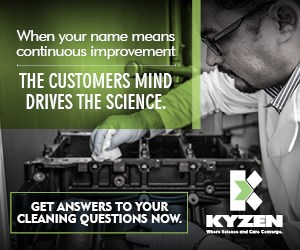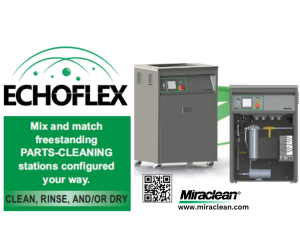Muda, Mura, Poka-Yoke and Other Four-Letter Words?
Giving credit where credit is due—even if it goes overseas.
Ronald Reagan is one of my personal heroes, as much for his steady and principled approach to leadership as for his politics and results.
Though I’ve moderated over the years, I generally support conservative political candidates, especially at the federal level. I’m proud of my uncles who served our country dutifully during World War II and I have honored their service and that of all active and veteran military by volunteering for and giving to numerous causes for their benefit.
I’m also proud of my father-in-law, for more than three decades a dependable, hard-working, dedicated and loyal union autoworker.
I have insisted on having at least one American brand car in my garage as far back as I can remember (at present a big black Chevy Tahoe).
I am a huge advocate for American manufacturing and American coatings operations.
And now for a big confession. An earth rattling confession. My secret. Ready? In spite of the preceding half dozen confessions that many would associate with a fierce red-, white- and blue-bleeding American…
Sometimes when speaking or writing about driving change in manufacturing or coatings operations, sometimes when helping customers and clients improve their processes, sometimes when leading continuous improvement events… I can’t believe I’m saying this. This is so embarrassing. Okay, I’ll just say it. (Deep Breath and Pause for effect.) Sometimes when doing these things… (Please Read in a Whisper)… I use Japanese words.
There, I admitted it—JAPANESE WORDS! Words like Kaizen, Muda, Mura, Poka-Yoke, Andon, Hoshin Kanri and so on. Japanese Words. To make it worse, I have been known to reference and even praise the work of Taiichi Ohno—the mastermind behind the Toyota Production System and modern lean manufacturing.
Oh the horror of it all!
To some, this may not seem like much of a confession. I recall a conversation earlier this year with a customer during which I tactfully and carefully nudged up against the subject. “What do you call C.I. here?” “What?” “You know, your continuous improvement events, what do you call them?” “We call them Kaizen events, why?”
I went on to explain that, from time to time, someone becomes offended when I refer to these as Kaizen events, so I’m always careful to ask. He was shocked. “You mean some people are actually offended by the word ‘Kaizen’?”
Oh Yes.
Following my presentations on Kaizen, people have told me they were affronted by the content. I have received emails from attendees telling me I should be ashamed of the credit I gave the Japanese for their role in Lean Manufacturing. A close business associate suggested that I back off “all the Japanese stuff” in my speeches.
Some asked if I have heard of the likes of W. Edwards Deming and Joseph M. Juran and why didn’t I give them, rather than the Japanese, the credit for the Lean Manufacturing movement.
Of course I’m familiar with Deming and Juran. The CEO of the Juran Institute even publically praised an edition of my column “Never Finished” as he keynoted a manufacturing event some years ago. And while I am a huge fan of both Juran and Deming for their post-World War II groundbreaking work in the areas of quality and quality management and fully acknowledge that the Kaizen movement might well not have been initiated without them, fact is the movement started in Japan and it was Japanese businesses that birthed modern Lean Manufacturing and Kaizen.
And that may be tough for some to accept. For some the echo of World War II, the war into which the U.S. was dragged by a Japanese attack, the war my uncles fought to win for America and the free world, still reverberates. For others, the pressure put on U.S. automobile manufacturers several decades ago (including the manufacturer that employed my loved ones and built my Tahoe) still stings. But for those clinging to the idea that no good idea could possibly come from that part of the world, that heaven forbid we credit the Japanese for the Lean Manufacturing movement or worse yet put it into practice here in the U.S., I have four words. That ship has sailed.
Two years ago I stood in the office of the plant general manager of one of the most iconic manufacturers in all of America. On his desk was a copy of Jeffrey K. Liker’s tome The Toyota Way. For some time I used that observation as my example that it was time for all U.S. manufacturers to accept that Kaizen works. I replaced that example about a year ago when I walked through the employee entrance of a Midwestern Big Three automotive plant.
Adorning the wall along the entryway was a poster enthusiastically inviting employees to participate in a company-sponsored occasion. On the poster big block letters encouraged team members to… "SIGN UP FOR OUR NEXT KAIZEN EVENT!"
And so it is that manufacturers across the U.S. are adopting the Kaizen approach to improving their businesses, and examples abound of coaters who have increased productivity on their paint, powder coat, ecoat and plating lines by anywhere from forty to three-hundred percent!
And well that they are accepting Kaizen, for when folks question whether it is wise for me to travel about the country evangelizing this foreign-born system for change leadership, my answer is simple. If it helps me improve my business, if it enables me to increase productivity, if it assists me in delivering product on time, in reducing leadtimes, and eliminating rejects, if it supports my efforts to lower cost and improve service to my customers and, yes, if it helps me keep manufacturing in the U.S. and keep American workers working… I don’t care where the idea comes from; I’m using it. And I make no apologies for that!
Related Content
Business Card Doubles as a Wet Film Thickness Gauge
The customizable card can be used to measure wet film thickness.
Read MorePCI Names 2023 Board of Directors, Executive Officers
The next individuals serving on PCI's board of directors and as executive officers have been selected.
Read MoreUmicore Metal Deposition Solutions Names Managing Director of Electroplating Business Line
Michael Herkommer has been named managing director of the electroplating business line at Umicore Metal Deposition Solutions.
Read MoreTop Shop’s Journey to Building a Unique Brand
Since this new Ohio plater took over the space and assets of a former plating business, it is intentional about setting itself apart from prior ownership.
Read MoreRead Next
Episode 45: An Interview with Chandler Mancuso, MacDermid Envio Solutions
Chandler Mancuso, technical director with MacDermid Envio discusses updating your wastewater treatment system and implementing materials recycling solutions to increase efficiencies, control costs and reduce environmental impact.
Read MoreEducation Bringing Cleaning to Machining
Debuting new speakers and cleaning technology content during this half-day workshop co-located with IMTS 2024.
Read MoreA ‘Clean’ Agenda Offers Unique Presentations in Chicago
The 2024 Parts Cleaning Conference, co-located with the International Manufacturing Technology Show, includes presentations by several speakers who are new to the conference and topics that have not been covered in past editions of this event.
Read More























